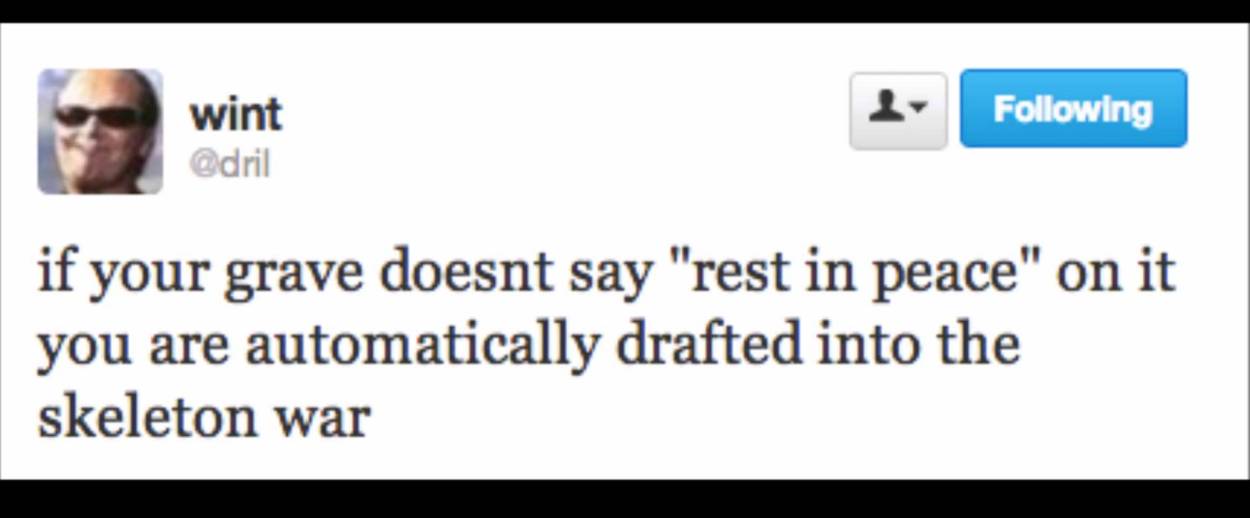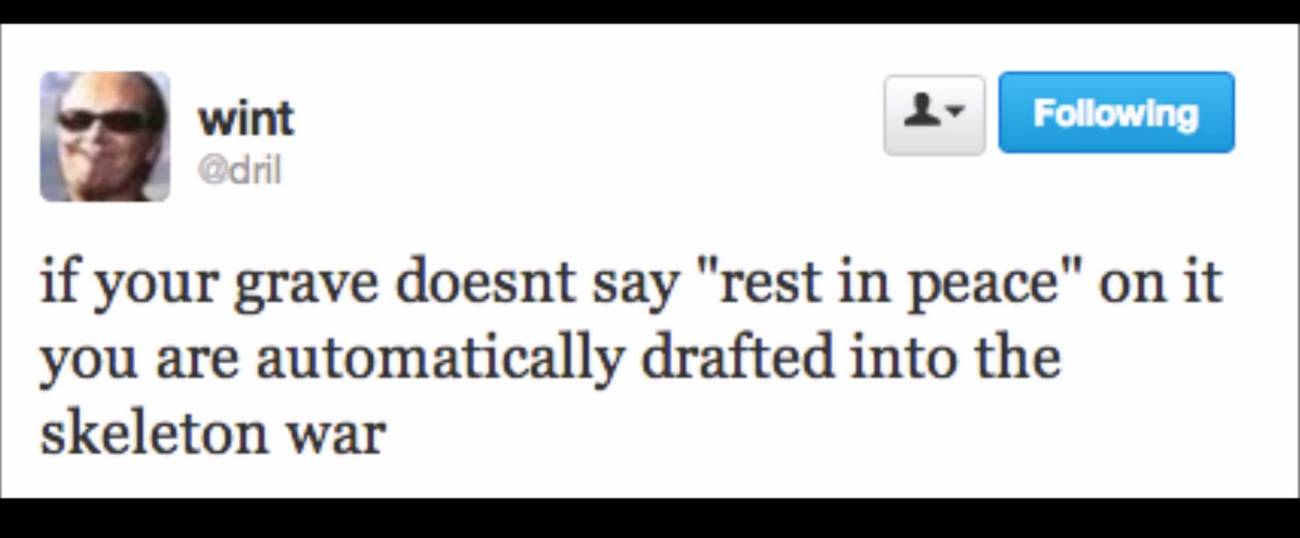In Praise of Dril, the Twitter Genius Who Is Never Funnier Than When He Tweets About Israel or Jews
And to think we almost lost this anonymous genius by callously revealing his real identity…




I remember where I was when I saw one of my favorite tweets for the first time. I was standing on a light rail platform in Jerusalem during the still, anxious afternoon hours that precede the arrival of Yom Kippur. Into the psychic disquiet of anticipation intruded a blast of pure sublime wonder:
huge disgusting man with extremely muscular fingers pokes at his tiny laptop while his emaciated servants groom him with squeegees #win
— wint (@dril) September 13, 2013
Let’s just chew over the language: “muscular fingers” and “emaciated servants groom him with squeegees” are phrases that don’t easily depart the consciousness, do they? The scene itself is a possible metaphor for the egoism and exploitation that fuels the modern-day creative economy (which perhaps explains why the tweet spoke to me at the time, and continues to speak to me). But maybe the tweet is a grotesquerie with no intended higher meaning—in which case one could hypothesize that the “#win” is the fact that the tweet’s anonymous author had made hundreds or even thousands of people envision a huge disgusting man with extremely muscular fingers pounding away at a laptop while being squeegeed by starving interns. The scene is funny—right?—and it’s even funnier now that you and I imagining it, or even thinking about it in any way whatsoever. Going by this interpretation, the biggest #win of all is to get someone to think about it, on and off, for over four years, as I have.
In that tweet, its author, identified only as Dril, pulled off a kind of literary magic trick that he’s reproduced several thousand times by now: Seldom has a writer packed so many layers of weirdness into such a tiny space with such astounding consistency. For his labors, Dril has been rewarded with over 900,000 followers, among them celebrities, leading journalists, and former members of both Republican and Democratic presidential administrations. He was also conferred with the ultimate in internet-based affection and respect: Anonymity. For years, there was no serious effort at figuring out who Dril was, since the possible cost of exposing him was so unthinkable. That all changed last week, when fans of a webcomic series, who suspected that Dril was part of their community, might have accidentally revealed his identity. Dril then went several days without tweeting, sparking fears that some of his admirers had effectively chased him off the internet (Dril had been “doxxed” on Reddit several years ago, but last week was the first time his identity reached any broad public awareness).
The mere possibility of Dril’s loss was a chance to reflect on his significance. Like Dante or Shakespeare, Dril is a creator of vernacular: If you’ve ever tweeted about the boys being back in town, or bemoaned some group of people being at it again, or ruminated on things “they” won’t even let you do, or asked for budgeting help because your family is dying, you’re quoting Dril, maybe without even consciously realizing it by now. He is creatively uncompromising; the astounding thing about Dril’s astronomical follower count is that he did it without ever watering himself down. Entire aesthetic and comedic theories of tweeting have come and gone, but Dril is still here, unyielding. He’s operated at a higher level than everyone, not caring whether the rest of the world would eventually catch up with him—through sheer force of genius, his sense of humor has become everyone else’s as well.
While the vast majority of Dril’s tweets are not about Jewish topics, his Jewish-themed tweets go a long way towards demonstrating why his loss was such a frightening possibility. Most notable among Dril’s Jewish-related material is the infamous (((Keebler elves))) tweet, which touched off the only funny anti-Semitism meta-controversy in the history of the internet:
i refuse to consume any product that has been created by, or is claimed to have been created by, the (((Keebler Elves)))
— wint (@dril) June 28, 2016
Self-righteous boobs swiftly accused Dril of making light of the parenthetical “echoes” that the alt-right employs to in order to identify Jewish targets for online harassment. Or, perhaps Dril was making light of the solidarity “echoes” that many Jewish and non-Jewish social media users added to their account names. Maybe Dril was literally accusing the Keebler elves of being secret crypto-Jews (as if that were really such a horrible thing for them to be). Look, Dril must have done something wrong, something problematic, right? The ensuing outcry, which is the subject of an entire section of Dril’s Wikipedia entry, enacted the very same hypersensitivity that the initial tweet was likely intended to skewer. Thus the backlash was seamlessly subsumed into the original joke, as an actual performance of outrage at anti-Jewish bigotry ensconced itself within an obviously satirical performance of anti-Jewish bigotry—not that he planned it that way. Or did he?
Dril’s Israel-related humor offers an even clearer distillation of the qualities that set him apart. The weirdo left-wing Twittersphere can be caustically hostile to Israel. Dril’s views on the country are both unknown and unknowable (thank God), and his jokes on the topic don’t fit along a neat pro-con axis. If anything, they mock anyone for appearing to care too much about the place.
For instance:
search “crash bandicoot is real”
>> Did you mean “Crash Bandicoot Israel”?
search “no”
— wint (@dril) April 13, 2013
This tweet could have ended at the word “real” and still been funny—not quite “Is Wario a libertarian?” funny, but amusing enough. The real joke here is the notion “Crash Bandicoot Israel” is a more common search than “Crash Bandicoot is real,” which is intuitively true because of course no one Googles whether Crash Bandicoot, a video game character, actually exists. But then the real real joke is that Dril has no interest in how or whether Crash Bandicoot has any connection to Israel—He wants to know whether Crash is real, dammit, even when given a chance to pursue a more sensible (although not that much more sensible) line of inquiry. Perhaps he’s the only person in existence with such uncompromising curiosity regarding the reality of Crash Bandicoot. The mere mention of Israel—a place and an issue that’s like a divining-rod for undistilled and unexamined self-importance—offers the perfect absurd contrast to the worldview on display.
The layered mockery continues in this tweet from earlier this year:
an angel slips a booklet of my top posts into the pockets of the pope, the master of islam, and b.netanyahu, and the world Rejoices in song
— wint (@dril) February 19, 2017
What a transcendent apotheosis of self-regard—if Twitter were a church, this image would be painted on its ceiling. In this lurid phantasmagoria of megalomania, Dril asserts that the entirety of monotheistic civilization is trifling in light of his body of work. Yes, Jews, even the prime minister of Israel, or whoever the master of your religion might happen to be, pales in comparison. Inasmuch as humor is a fundamental human need, Dril isn’t really wrong about that. It’s great to have him back.
Armin Rosen is a staff writer for Tablet Magazine.